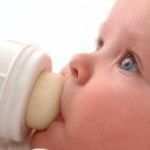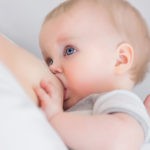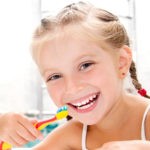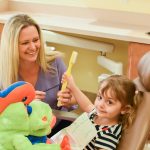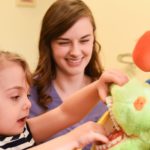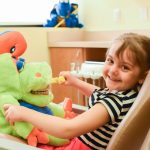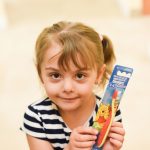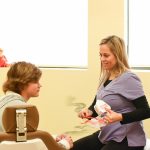Parents Corner
BRUSHING TIPS
Birth to 2 years of age:
- Infant bottle feeding
- Nursing Infant
BEFORE TEETH ERUPT, clean your baby’s mouth and gums with a soft cloth or infant toothbrush at bed time. This helps to prepare your baby for having the teeth cleaning when they erupt.
ONCE THE TEETH ERUPT: If your baby is given a bottle when going to sleep, the teeth should be brushed (soft bristled brush/water) after the milk is consumed or at the very least wiped with a wash cloth. If your baby nurses to fall asleep the same applies ( ideally teeth should be brushed or at least wiped after nursing). Practically speaking, it may be tricky to keep your baby sleeping while doing this, we will discuss your baby’s cavity risk and tips to try and help you in this process.
Babies that do not sleep through the night and wake frequently requiring milk or formula in the middle of the night are particularly at risk for cavities. Bottles containing any sugary liquids or carbohydrates such as milk, formula or fruit juice, put teeth under attack from bacterial acid all night long while the mouth is dry with minimal salivary flow. The Canadian and American Academies of Pediatric Dentistry recommend that if a child requires a bottle at night then there “should be nothing but water”.
TIPS
- Brush your baby’s teeth twice daily (in the evening it is important to do so at bedtime).
- Floss daily if any teeth make tight contacts.
- Never dip a pacifier in anything sweet.
- Give your baby a firm rubber teething ring to chew on to help with the discomfort and potential pain of teething. Avoid liquid-filled teething rings, or any plastic objects that might break. Schedule regular dental check ups, usually every 6 or 9 months (frequency will be discussed).
TOOTHPASTE
Following the First Year Exam and at all subsequent exams we will assess and discuss your baby’s cavity risk and recommend an appropriate toothpaste. Depending on a variety of factors, one or more of the following list of toothpastes may be recommended: Xylitol, MI paste, Hydroxyapatite or Fluoride. If fluoride is recommended the amount and frequency will be discussed (always supervised and kept out of reach).
Age 2-5
- Branden and Sophia-beautiful smiles
- Charlotte showing off her new toothbrush!
- We did a great job!
Brush your child’s teeth twice a day using a soft bristled brush. Floss your child’s teeth once a day wherever two teeth are touching
TOOTHPASTE At every check up we will assess and discuss your child’s cavity risk, recommend and discuss an appropriate toothpaste. Depending on a variety of factors, one or more of the following list of toothpastes may be recommended: Xylitol, MI paste, Hydroxyapatite or Fluoride. If fluoride is recommended the appropriate amount and frequency will be discussed (always supervised and kept out of reach).
HABITS Sucking a thumb, finger or pacifier can affect your child’s teeth. Most children stop this habit on their own; if not, try to discourage it by age 3 or ask us for other creative ideas.
SNACKING Keep an eye on snacking—ideally children should have no more than three snacks a day. Encourage water drinking after snacks. Brush teeth after sticky foods (even after healthy snacks like raisins and granola bars). Grazing and easy access to snacks (even health ones) greatly increases a child’s risk for developing cavities.
JUICE whether homemade, organic or from a juice box, these sweet drinks, diluted or not, literally bathe teeth in sugar. Try to limit the amount of juice you give to your child to one cup per day, preferably with a meal.
School-Aged Children
- Sonya loves to brush!
- “Let’s brush Dino’s teeth Kerry”
- Great job Bella!
- Great job Bella!
- “I did a great job!”
Parents should supervise the brushing of teeth for school-aged children until they are seven or eight years old.
Brushing should be done twice a day ( snacks are not to be consumed after brushing in the evening)
Brushing three times a day is recommended if your child has any type of orthodontic therapy. Flossing should be done once a day in every area in the mouth where two teeth meet. (Parents will need to supervise their child to ensure that it is done correctly)
TOOTHPASTE At every check up we will assess and discuss your child’s cavity risk, recommend and discuss an appropriate toothpaste. Depending on a variety of factors, one or more of the following list of toothpastes may be recommended: Xylitol, MI paste, Hydroxyapatite or Fluoride. If fluoride is recommended the appropriate amount will be discussed (always supervised and kept out of reach).
RINSE Depending on your child’s risk for cavities, a fluoride or xylitol rinse may be recommended.
SNACKING Keep an eye on snacking—ideally children should have no more than three snacks a day. Encourage water drinking after snacks. Brush teeth after sticky foods (even after healthy snacks like raisins and granola bars). Grazing and easy access to snacks (even health ones) greatly increases a child’s risk for developing cavities.
JUICE whether homemade, organic or from a juice box, these sweet drinks, diluted or not, literally bathe teeth in sugar. Try to limit the amount of juice you give to your child to one cup per day, preferably with a meal.
TIPS
- Chew gum with xylitol (not in class though!) a non sugar naturally occurring substance that stimulates saliva flow and helps to clean the mouth.
- Avoid carbonated and sports drinks which erode enamel.
- Cheese is a “cavity-safe” snack
MOUTHGUARD Protect your child’s teeth with a mouthguard when they participate in physical activities, including sports and leisure activities.
Teens
- Assessing oral growth and development from birth to teen years
- Ben learns some brushing tips
Brushing should be done twice a day (snacks are not to be consumed after brushing in the evening)
If your teen is in braces then brushing three times daily is recommended.
Flossing should be done once a day in every area in the mouth where two teeth meet. (Parents may still need to give their teen some tips or a hand as this may be tricky for some still at this age)
*Brushing and flossing will be reviewed at every check up appointment.
TOOTHPASTE At every check up we will assess and discuss your teens’s cavity risk, recommend and discuss an appropriate toothpaste. Depending on a variety of factors, one or more of the following list of toothpastes may be recommended: Xylitol, MI paste, Hydroxyapatite or Fluoride. If fluoride is recommended the appropriate amount will be discussed.
RINSE Depending on your teen’s cavity risk a fluoride or xylitol rinse may be recommended.
SNACKING Keep an eye on snacking—teens should have no more than three snacks a day. Water drinking is encouraged after snacks. Brush teeth after sticky foods (even after healthy snacks like raisins and granola bars). Grazing/frequent snacking (even health snacks) greatly increases a teen’s risk for developing cavities.
JUICE whether homemade, organic or from a juice box, these sweet drinks, diluted or not, literally bathe teeth in sugar. Be careful with drinks like iced tea and carbonated beverages, coffees and teas as well, sipping on these types of drinks increases the risk for cavities.
SPORTS DRINKS can erode enamel and cause serious harm to teeth and should be limited if not avoided completely.
TIPS
- Teens sometimes develop bad habits while studying (staying up late and sipping on tea, coffee, soda etc) this can have detrimental effects on their teeth. Also, keep in mind that stress and a lack of sleep diminishes saliva flow and increases chances for dental disease.
- Chew gum with xylitol (not in class though!) a non sugar naturally occurring substance that stimulates saliva flow and helps to clean the teeth.
- Avoid carbonated and sports drinks which erode enamel on the teeth.
MOUTHGUARD Protect your teen’s teeth with a mouthguard when they participate in physical activities, including sports and leisure activities.
HABITS This is a time when some of the following issues may arise that may have harmful health effects on your teen’s oral and systemic health: oral piercings, smoking, drinking etc…. All have devastating effects on teeth and gums and can be discussed at check up appointments with appropriate consent, discretion and compassion.

